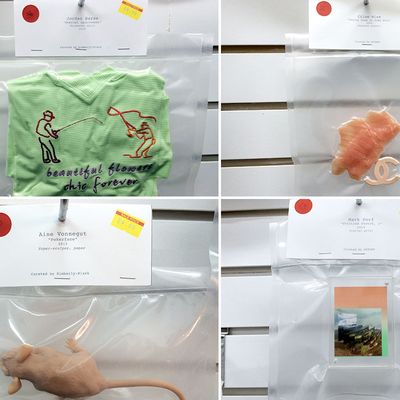
CanÔÇÖt (yet) afford to drop $179 million on a prized Picasso? What if you only have $9.99 and want to participate in the art world this week? YouÔÇÖd have a hard time getting a sandwich at the fancy food court at the Frieze Art Fair for that little (and a day pass alone costs four times that amount ÔÇö and thatÔÇÖs just to get in). But at a 200-square-foot storefront in Bushwick, where not (yet, they hope) name-brand artists got together on May 9 for a group exhibition and fund-raiser, you could buy anything on the walls for ten bucks (cash only).
The event was hosted by 99┬ó Plus Gallery to celebrate its one-year anniversary since opening in what was formerly a 99-cent store on Wilson Avenue in deep Brooklyn. Wedged between a corner bodega and a tiny real-estate agency and across from Outlet gallery, itÔÇÖs still trimmed with the original red, white, and blue awning, now updated to spell its full name. Owners Simran Johnston, Zoe Alexander Fisher, and Riley Strom, all in their mid-20s and, early that evening, already overwhelmed by the turnout, had invited nine nearby galleries to showcase 11 of their artists in one tight but brightly lit room. Each had donated one of their artworks to sell to support the young space, home to a gallery for exhibitions and events, FisherÔÇÖs design store HANDJOB, and an art studio for one residency at a time. Like at an actual 99-cent store, nothing was actually on sale for less than a dollar, but yellow price stickers valued each piece at just $9.99.
ÔÇ£ItÔÇÖs about the idea of accessibility, making artwork as accessible as the objects you would find in a 99-cent store,ÔÇØ explained Scott Goodman, who owns participating gallery Good Work Gallery. ÔÇ£The work you find at an art fair is inaccessible to most people.ÔÇØ
Among the 99 offerings: one of Mark DorfÔÇÖs prints of digitally altered landscapes; one troy ounce, .999 fine silver bar contributed by Brooklyn artist Elizabeth Ferry; a letter from Nadja VoorhamÔÇÖs grandmother in Amsterdam promising to text the buyer photos of her breakfast for one week; an ink drawing of a nude woman by San FranciscoÔÇôbased artist Chris Lux; an iron-on patch of flowers by Dennis Witkin, who leaves virtual blossoms on grave sites through FindaGrave.com; a USB drive holding a single JPEG of a cat by Ryan V. Brennan; and printmaker Rebecca GilbertÔÇÖs flyer of tear-off tabs that read, ÔÇ£Dudes Doing What Dudes Do.ÔÇØ
In keeping with the consumer-product theme, each artwork came in a clear, vacuum-sealed bag and was hung from a simple rod hook. Bag toppers replaced wall labels in proclaiming the titles of works and their artists, many of whom were present. With its white walls covered in rows of these packaged tchotchkes ÔÇö themselves seen as products of collaborative creation by some attendees ÔÇö the space resembled the inside of an orderly hardware store.┬á
ÔÇ£TheyÔÇÖre cash only,ÔÇØ a young woman waiting in line said, sighing. ÔÇ£Can I Venmo you?ÔÇØ she asked her companion, who wore double braids and heavy denim, from head to toe. Ahead of the pair, Bushwick-based artist Jordan Barse handed Johnston ten bucks for a painted, nine-piece puzzle of a cat-faced, naked woman clutching a dog made by the collective Destineez Child (which is shown at the gallery Kimberly-Klark).┬á
Barse herself had also donated something related to her current interest in ÔÇ£fashion and fishing, driven by this idea of people being on hooks and led around places, kind of blindly,ÔÇØ she described. The mint-green, thrifted tank top, which she had embroidered with fishermen and the phrase ÔÇ£beautiful flowers, chic forever,ÔÇØ was picked up ÔÇö unbeknownst to her ÔÇö by Robert Grand, an artist originally from Nashville who now lives in Ridgewood. ÔÇ£IÔÇÖm just a big fan of embroidery,ÔÇØ Grand exclaimed. ÔÇ£It has this cheesy, kitschy aesthetic, but itÔÇÖs also very refined.ÔÇØ
All the art sold out in less than an hour, faster than the dollar cans of beer on hand, and almost as fast as it took ChristieÔÇÖs to sell $700 million worth of art a few nights later.

